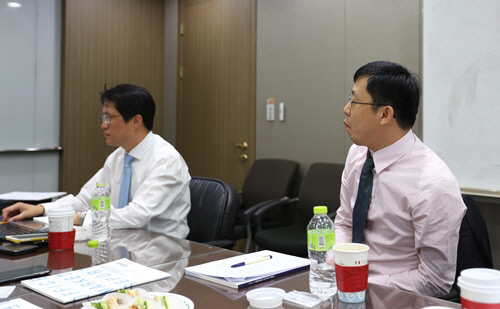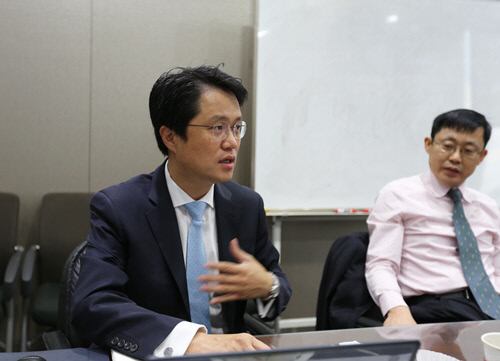This article was published on September 22, 2014 at 10:23 The Bell paid pageThis is an article that appeared in .
◇ Reliability of collected information is low... Active disclosure for U.S. marketing purposes
society = There seem to be quite a few side effects due to limitations in information collection. Why can’t we get proper statistics?
Chaewook Lim = Genstar is evaluated as having solid basic data on the Korean commercial real estate market. However, I do not 100% trust this data myself. This is because not only are there problems with the research method, but there are also limitations in selecting a sample of information. The people who provide key building information are quite closed. I don't know if the information is true or fabricated.
Genstar manages about 100 Samsung Life Insurance buildings in various regions across the country. However, all related data cannot be disclosed. The reason is that there is no foundation in place to provide raw internal information to other investigative agencies or competitors. The same goes for pension funds, which are big players in the office building market. We often hear that it is difficult to share information internally. There is an underlying perception that there is no benefit to information being leaked out. The concern is how much information collected in such a closed situation can be trusted.
Jang Jin-taek = National apartment prices managed by the Ministry of Land, Infrastructure and Transport are highly reliable. In the case of office buildings, since it is led by private companies, the investigation method itself is bound to be unclear. Collecting information through interested parties such as the landlord and management director itself makes no sense. As it stands, an objective investigation is impossible. And distorted information is exposed to the outside world through the media without filtering. A system for producing and distributing objective data must be introduced.
Seongjin Jeong = Market research by Genstar, Cushman, etc. is systematic to some extent. I'm doing pretty well. When I'm in the field, research staff often come by. You cannot lie to employees who come to the scene. Since they have seen it all, they tell the truth. However, the problem is that some companies only conduct investigations by phone. In such cases, reliability is significantly reduced.
 | | Jang Jin-taek, director of Remax Korea (right), argues that the reliability of market reports issued by the office building industry has been damaged due to limitations in information collection. (Left is Genstar CEO Yoon Yeo-sin.) |
|
society = Is it a structure that has no choice but to rely entirely on the landlord for information collection? I know that information on global markets, including the U.S., is quite accurate.
Wonseop Yoon = The approach to vacancy rate itself is different. Domestic building owners are reluctant to disclose even drawings, saying they are confidential. To rent, you need a drawing, but they don't make it public. This is reflected in our sentiment of not wanting real estate information to be known to others. However, in the West, as part of marketing, the vacancy rate that will occur in the future is notified in advance. This is possible because the building owner does not directly lease the property but outsources it to an external company. Building management companies are only successful when they fill vacancies. Therefore, we disclose accurate information and gather tenants.
In particular, if a contract is about to be renewed, detailed data for 90% or higher is provided. It contains the end time of each tenant's lease period, rent, etc. That’s not possible in Korea. Because there are so many vacancies, people worry about taking out tenants or lowering the rent. Therefore, building owners often keep quiet even when the vacancy rate soars above 20%. And they disclose false vacancy rates to the outside world.
Chaewook Lim = I met with an official from a major real estate research company in New York last March. Some of the 200 or so employees said they would research and present office buildings, retail real estate, and warehouses across all 50 states in the United States. Although a few people cling to it, the information is substantial. This is because professional PM companies that manage buildings actively disclose information. For them, it is important to maintain the building well and extract rent. Disclosing one's own information in order to obtain information about others. This is how building information is distributed. The idea is to do better marketing with each other. Ultimately, it is a difference in perception.
◇Surge in 'rent-free' to attract tenants... strong sales price
society = Do limitations in access to information actually affect rent, etc.?
Yeon Goddess = In rural areas, rent distortion is severe. There are still many cases where rent is set based on price per pyeong rather than guaranteed monthly rent. In some places, maintenance fees are more expensive than rent. I do a lot of persuasion while managing local buildings. We need to constantly change perceptions by emphasizing that it is much more advantageous to disclose one's information. The national average rent increase rate is less than 3% per year. There are many contracts that do not even reflect price increases. The building owner is at a loss every year. In addition, they provide rent free every year.
Generally, when a class A building is newly constructed, a prime class building tenant must be brought in. That way, the lessee can move without any additional burden. But now, they are moving from B- and C-class buildings to A-class buildings. Of course, rents are bound to increase. The tenant's additional expenses are inevitably preserved as rent-free. Then, tenants relocating from the prime class are in trouble. One way or another, it is inevitable that there will be a lot of rental free. Recently, as office relocations have increased for reasons such as rent, the barriers to the traditional rental industry in downtown Seoul have been broken.
 | | Genstar CEO Yoon Yeo-shin (left) says that with the advent of rent-free, the walls of the traditional rental industry in downtown Seoul have been torn down. (On the right is Jang Jin-taek, director of Remax Korea.) |
|
society = What is the selling price?
Yeon Goddess =This is because landlords sign long-term contracts. Either sign a 10-year contract from the beginning or add additional extension conditions to the 5-year contract. This is a method of providing rent free after a long-term rental agreement and receiving an increase in rent according to the terms of the contract. Therefore, from the perspective of prospective building buyers, there is an incentive to invest because rents will rise in the future.
Jang Jin-taek = Have you ever looked into rent-free?
Yeon Goddess = Investigated. I told PM companies not to give too much away.
Wonseop Yoon = The terms of the rent-free contract are important. There is a difference between receiving 10 months' worth of compensation for a 5-year contract and receiving 10 months' compensation for a 10-year contract. The contract period is important. If you only look at the numbers, confusion arises. Depending on how you contract for interior design costs in addition to free rent, it may seem big or small. From the tenant's perspective, it is not important to receive a few more months of rent-free anyway, but what is important is how much the actual cost is paid within the contract period. Building owners like to reflect rent-free at the beginning of the year to hedge risk and enjoy the effect of rising rents. Depending on the circumstances, coverage may be provided at the end of the year.
Jang Jin-taek = Rent-free is a fact that most tenants are aware of. I don’t think it’s a problem that can be hidden just by hiding it.
→Continued in Part 3 of the discussion.
Original link: http://www.thebell.co.kr/front/free/contents/news/article_view.asp?key=201409220100031250001940